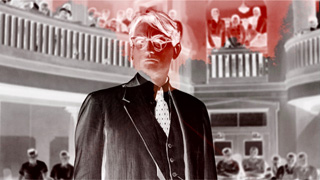Did You Wonder Who Fired the Gun?
 USA / 2017 / English / Color, B&W / DCP / 90 min
USA / 2017 / English / Color, B&W / DCP / 90 min
Director, Script, Photography, Editing, Source: Travis Wilkerson
In 1946, in Dothan, Alabama, the director’s white great-grandfather shot a black man dead. The director digs up this story, hidden and forgotten by his family, starting with old newspaper articles. The documentary pursues, in the filmic grammar of suspense, the reality of his family’s collective racial prejudice in the realm of family secrets. In divulging the personality of his grandfather—a racist who also displayed violence toward his own family—as brutal towards those who are weak, Travis Wilkerson claws out the roots of evil in U.S. society, where white supremacy remains powerful, then as now.
[Director’s Statement] It’s a strange sensation when my work is included in significant forums. I make very modest films. I really regard myself as nearer to an amateur filmmaker. As such, as the origins of the word suggest, I’m offering a version of my love to the films I make. I’m also offering the second most sacred thing we can offer: my labor. This time I offered my love and my labor to a film that I wished somehow to be corrective. A film about the worst of my family. I didn’t do this simply to be provocative or masochistic even, but rather because the only thing I believed I might be able to offer the Spann family, and to the community in which he lived, whether intact or destroyed—the sincerest acknowledgment I could that what SE Branch did was wrong, part of a long history of abusive behavior towards those in positions of lesser power than he. In Alabama, in the 1940’s, this meant he directed his abuse and violence against black people first and foremost, but also against women of all races. I discovered how deeply interconnected these specific forms of oppression were. It seems to me pretty clear that if you can’t take meaningful account of oppression, if you can’t name and confront it; if you can’t make your position on it clear, you allow it to go on. This is as true for a country as it is for a family. I’ve long believed that US society hasn’t been honest about itself, its abuses, its militarism. And I’m also convinced the present moment we find ourselves in is a result of that failure. But everything begins in the family. And so I tried to deal with mine.
A chance meeting in Havana with legendary Cuban film propagandist Santiago Alvarez changed the course of Travis Wilkerson’s life. He now makes films in the Third Cinema tradition, wedding politics to form in an indivisible manner. In 2015, Sight & Sound called Wilkerson “the political conscience of American cinema.” His films have screened at scores of venues and festivals worldwide, including Sundance, Toronto, Locarno, Rotterdam, Vienna, Yamagata, the FID Marseille and the Musée du Louvre. His best-known work is an agit-prop essay on the lynching of Wobbly Frank Little called An Injury to One, named one of the best avant-garde films of the decade by Film Comment. His most recent fiction feature, Machine Gun or Typewriter? (2015) premiered at Locarno 2015 and was awarded Best International Feature at DokuFest (Kosovo). It has since screened worldwide and was recognized as one of the finest films of the year on numerous lists including La Furia Umana and DesistFilm. His writings on film have appeared in Cineaste, Kino!, and Senses of Cinema. He has taught filmmaking at the University of Colorado and Film Directing at CalArts, and was the inaugural Visiting Fellow of Media Praxis in the Pomona College Media Guild. Presently, he is a Visiting Assistant Professor of Film at Vassar College. He is also the founding editor of Now: A Journal of Urgent Praxis. His other films including Accelerated Development (1999, YIDFF ’99) and Distinguished Flying Cross (2011, YIDFF 2011) have been shown at this festival.
